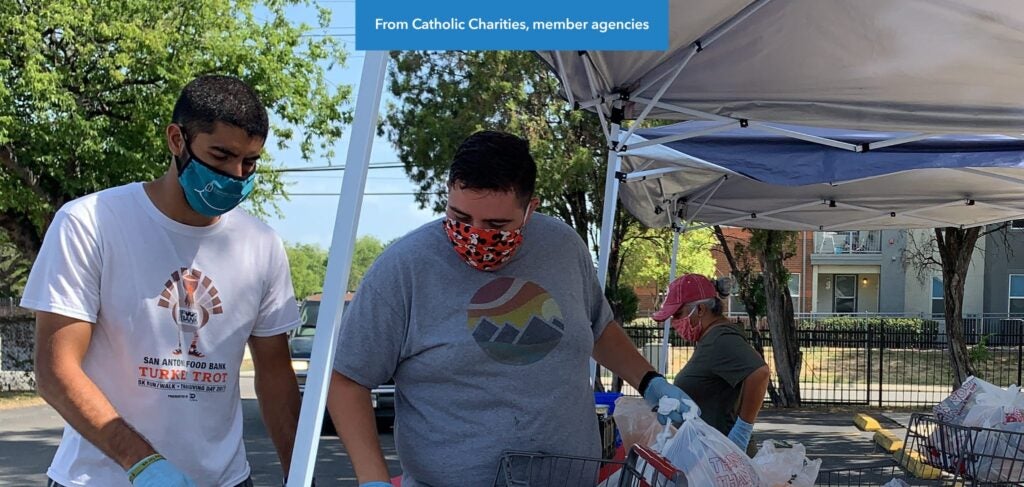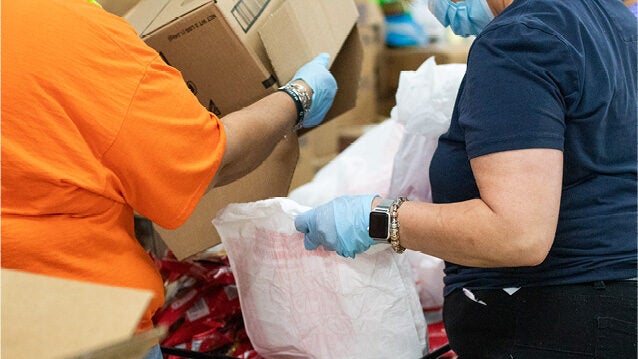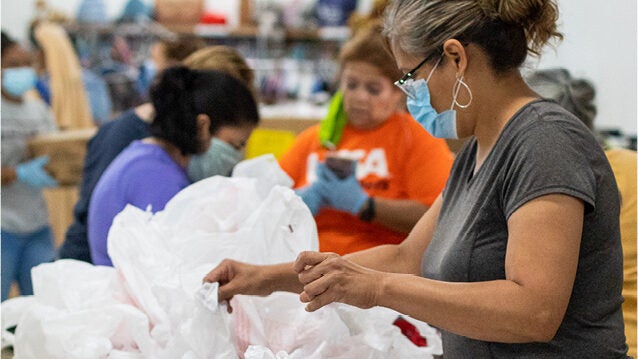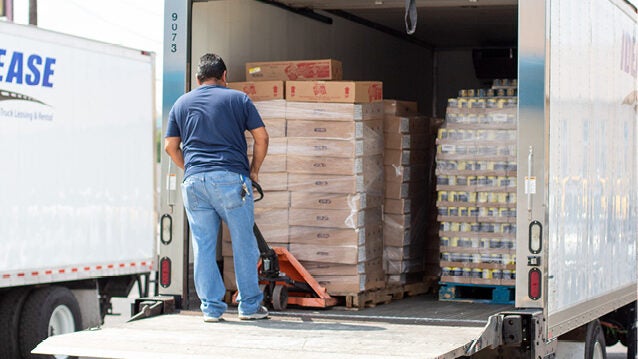
Matthew 25:35: ‘For I was hungry, and you gave me food’

By Deanna Wolf, Community & Volunteer Engagement Manager, Catholic Charities Diocese of San Diego
In the rapidly changing reality of COVID-19, the Most Reverend Robert W. McElroy, bishop of the Diocese of San Diego, called upon the Board of Catholic Charities Diocese of San Diego at their meeting March 12, 2020, to address the increasing needs of vulnerable populations.
The bishop reminded the group that almost 100 years ago, Catholic Charities along the West Coast were born as a result of the devastation created by the Spanish Flu, and now Catholic Charities Diocese of San Diego was called upon, during its centennial year, to address the devastation created by COVID-19 within our communities.
Anticipating the changing needs of the community, CEO Vino Pajanor and the leadership team at Catholic Charities created the Emergency Food Distribution Network. The team knew that the traditional model for food distribution would not be viable during the pandemic. Unemployment numbers were climbing daily. Seniors could not safely leave their homes. People were hungry. Jesus fed the disciples before he would teach them. Couldn’t we, as Church and Catholic Charities, do the same?

When Pajanor suggested during the board meeting the idea of Catholic Charities leading a diocesan-wide effort to feed the hungry, Bishop McElroy quickly pledged his support and promised to enlist three deans from the diocese to help Catholic Charities recruit an even greater number of parishes to participate.
Providentially, our organization’s leadership team had worked hard during late 2019 to develop relationships with a handful of parishes throughout the diocese, inviting them to partner with Catholic Charities as food distribution sites. The fruits of our labor paid off.
Catholic Charities was set to open monthly mass food distribution sites at two large parishes in the diocese during the Spring of 2020. As the number of COVID-19 cases grew across the country, gatherings of close to 300 people at these sites left us with fear for the health and safety of our communities. Hunger does not stop for a pandemic; it is exacerbated by it. We needed to change our model.
A new model had to be quickly implemented in order to provide resources to a growing number of people experiencing food insecurity during COVID-19. We had two main considerations: We needed to modify operations for social distancing and to gather fewer people together.
Several brainstorming sessions, spreadsheets and charts later, our food distribution model became decentralized through the Emergency Food Distribution Network. None of this could have happened without the support of our partners. A call was put out to an initial list of seven parishes in the diocese, asking them to host a drive-thru food pantry and conduct home-delivered meals in the surrounding community. All seven parishes answered the call and became our beta-test partners the week of March 25.

On April 6, Catholic Charities Diocese of San Diego officially launched the Emergency Food Distribution Network with 21 participating parish partners and 519 engaged volunteers. Thanks to the generosity and unfailing support of the diocesan high school, Cathedral Catholic, it became the central pickup location for our parish partners. Catholic Charities filled the school’s parking lot, gym, and theater with pallets and boxes of nearly 2,500 food packages that were distributed to our parish partners that first wet and rainy day in April.
Our Community Services Program now works closely with parish coordinators from each emergency food distribution site to support weekly operations of the drive-thru food pantry and home deliveries of food to the surrounding community. These parish coordinators, many of whom are parish staff, give tirelessly to the effort. In turn, Catholic Charities has partnered with the Diocese of San Diego to reimburse parishes for the hours their staff contribute towards the Emergency Food Distribution Network.
An average of 250 volunteers work at various parishes each week as distribution assistants, packing assistants and home-delivery drivers. The Knights of Columbus San Diego Chapter demonstrated incredible leadership as volunteer drivers, showing up even for last minute, unscheduled needs. In a time when so many people feel helpless about how to respond, Catholic Charities gives them the opportunity to be the Good Samaritan that Christ has called us to be by feeding his people.
As parishes begin to reopen, we are looking ahead to the next phase of the Emergency Food Distribution Network. We hope to let our partners lead the way. Sustainable solutions and programming come from the community. Our parishes are uniquely situated as safe, trusted places not only for parishioners but also for many members of the community. Parish staff know the needs of their neighbors intimately. Catholic Charities will join parishes, heeding their experience, in growing the Emergency Food Distribution Network through deep, authentic partnerships that adapt to the ever-changing environment.

The Emergency Food Distribution Network of Catholic Charities Diocese of San Diego involves two parish coordinators per parish doing a combined 20-40 hours of work per week to coordinate the volunteers and food distribution. Catholic Charities prepared a budget that factored in the costs and then raised funds for the network. When funders/donors asked why support for parish coordinators was necessary, Catholic Charities validated the expense for the benefit of advanced planning and the sustainability of the program.








